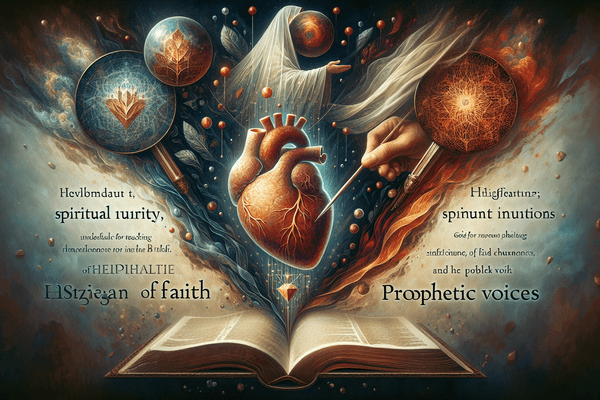The Power of Persistent Faith
The account of the Canaanite woman in Matthew 15 is a powerful illustration of persistent faith in action. Despite being initially ignored and then tested by Jesus, the woman persisted, ultimately receiving praise from Jesus for her great faith: \"Woman, you have great faith! Your request is granted\" (Matthew 15:28). The story of this woman demonstrates that faith is not a passive quality but an active force, as described in Hebrews 11:1, which defines faith as confidence in what we hope for and assurance about what we do not see. The Canaanite woman's story also aligns with the teachings of Jesus in Matthew 7:7-8, where He urges His followers to ask, seek, and knock, promising that their persistent efforts will be rewarded. Her example serves as a beacon, showing that humility and persistence in faith can indeed move mountains and that the power of faith is available to all who earnestly seek God's grace.
The Rapture and the Church
The concept of the rapture has captivated the imagination of many believers, representing the hopeful anticipation of being caught up with the Lord in the air (1 Thessalonians 4:16-17). This event is seen as a fulfillment of Jesus' promise to return and take His followers to be with Him, as He mentioned in John 14:3. While the timing and nature of the rapture remain subjects of debate among Christians, the central message is one of hope and assurance. In a similar vein, the challenges and trials we face in life can be navigated with hope and guidance found in the scriptures, as explored in our article on navigating life's challenges through biblical wisdom. The apostle Paul reveals a mystery in 1 Corinthians 15:51-52, where he speaks of a transformation that will occur in a moment, in the twinkling of an eye, at the last trumpet. This transformative event is a cornerstone of Christian eschatology and serves as a reminder of the promise of eternal life with Christ. The imagery of the Son of Man coming on the clouds with power and great glory, as described in Matthew 24:30-31, further solidifies the anticipation of this divine rendezvous.
The Church During Tribulation
The book of Revelation paints a picture of tribulation—a time of great challenge and testing for the church. This period is marked by the need for witness, testimony, and perseverance. Believers are called to remain steadfast in the face of adversity, holding onto their faith as Revelation 2:10 urges the church in Smyrna to 'be faithful, even to the point of death.' The tribulation is not merely a time of suffering; it is also a time of divine protection and purification. As Revelation 12:14 depicts the woman given wings to escape the serpent, so too is the church promised deliverance and strength to endure. Daniel 12:1 speaks of a time of distress such as has never happened, indicating the unparalleled nature of this period. Yet, the message to believers is one of hope and the assurance of God's unwavering presence throughout even the most tumultuous times.
FAQ
Q: What does Jesus mean when He says it's not what enters the mouth that defiles a person?
A: Jesus is emphasizing that moral and spiritual purity cannot be achieved through adherence to dietary regulations alone. True defilement is a matter of the heart, involving evils such as evil thoughts, murder, and slander (Matthew 15:11, 18-20).
Q: Can Christians eat pork according to the teachings of Jesus?
A: In Matthew 15, Jesus addresses the spiritual condition of the heart rather than specific dietary laws. The apostolic teachings in the New Testament, especially those of Paul, indicate a new understanding of food and purity in light of Christ's teachings.
Q: How does Jesus respond to the Canaanite woman's faith?
A: Jesus commends the Canaanite woman for her great faith and heals her daughter at that very hour (Matthew 15:28).
Q: What is the rapture, and what does it signify for believers?
A: The rapture refers to the event when believers will be caught up with the Lord in the air (1 Thessalonians 4:16-17). It signifies the hope and assurance of eternal life with Christ and the fulfillment of His promise to return for His followers.






